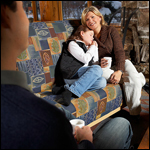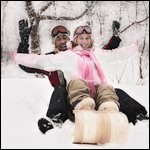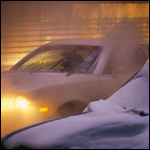Stay Safe and Healthy in Winter Weather
 Although winter doesn't come as a surprise, many of us are not prepared for its arrival. If you are ready for the hazards of winter, you will be more likely to stay safe and healthy when temperatures start to fall.
Although winter doesn't come as a surprise, many of us are not prepared for its arrival. If you are ready for the hazards of winter, you will be more likely to stay safe and healthy when temperatures start to fall.Staying Safe and Healthy at Home

Many people prefer to remain indoors in the winter, but staying inside is no guarantee of safety. Take these steps to keep your home safe, healthy, and warm during the winter months:
- "Winterize" your home.
- Install weather stripping, insulation, and storm windows.
- Insulate water lines that run along exterior walls.
- Clean out gutters and repair roof leaks.
- Check your heating systems.
- Make sure that your heating system is clean, working properly, and ventilated to the outside.
- Inspect and clean fireplaces and chimneys.
- Install a smoke detector.
- Have an alternate heating source and alternate fuels available.
- Prevent carbon monoxide emergencies.
- Install a carbon monoxide (CO) detector to alert you of the presence of the deadly odorless, colorless gas.
- Learn symptoms of CO poisoning: headaches, nausea, and confusion.
- Keep grills and generators out of the house and garage.
- Be prepared for weather-related emergencies, including power outages.
- Stock food that needs no cooking or refrigeration, and water that is stored in clean containers.
- Keep an up-to-date emergency kit, including battery-operated devices (if possible, a NOAA Weather Radio), extra batteries, extra medicine, and baby items.
Staying Safe and Healthy Outdoors or While Traveling

Many people spend time outdoors in the winter working, traveling, or enjoying winter sports. Outdoor activities or travel in winter can expose you to hazards to your safety and health, but you can take these steps to prepare for them:
- Have appropriate clothing to wear outdoors: layers of light, warm clothing; mittens; hats; scarves; and waterproof boots.
- Keep a supply of salt, cat litter, or sand to sprinkle on icy patches.
- Learn safety precautions to follow when outdoors:
- Work slowly when doing outside chores.
- Be aware of the wind chill factor.
- Take a buddy and an emergency kit when you are participating in outdoor recreation.
- Avoid traveling when the weather service has issued advisories.
- If you must travel, inform a friend or relative of your proposed route and expected time of arrival.
- Prepare your car for winter.
 Service the radiator and maintain the antifreeze level; check the tire treads.
Service the radiator and maintain the antifreeze level; check the tire treads.- Keep the gas tank full to avoid ice in the tank and fuel lines.
- Use a wintertime formula in your windshield washer.
- Keep a winter emergency kit in your car in case you become stranded. Include blankets, food and water, and plastic bags (for sanitation).
- Learn safety rules to follow in case you become stranded in your car.
- Stay with your car unless you can reach a safe location no more than 100 yards away.
- Run the engine and heater only 10 minutes during every hour.
- Keep a downwind window open.
- Make sure the tailpipe is not blocked.


Helping Other People
Be sure to check on family and neighbors who are in greater danger from cold weather hazards. Young children, older adults, and people with chronic illnesses are more likely to have health problems caused or worsened by cold weather.
Keeping Your Pets Safe and Healthy
If you have pets, bring them indoors. If you cannot bring them inside, give them adequate shelter to stay warm outside. Also, make sure they have access to unfrozen water.
Preparation Is the Key
No one can stop the onset of winter, but if you follow these suggestions, you'll be ready for winter when it comes.
More Information
- Listen to or download a podcast:
- Preventing Hypothermia and Frostbite (
 0:50 mins) (2007)
0:50 mins) (2007) - Recognizing Frostbite (
 0:50 mins) (2007)
0:50 mins) (2007) - Recognizing Hypothermia (
 0:50 mins) (2007)
0:50 mins) (2007) - Avoiding Carbon Monoxide Poisoning during a Power Outage (
 0:54 mins) (2007)
0:54 mins) (2007) - Proper Use of Candles during a Power Outage (
 0:49 mins) (2008)
0:49 mins) (2008)
- Preventing Hypothermia and Frostbite (
- Winter Weather
- Winter Weather: Take Steps
- Winter Weather: Stay Safe and Healthy
Current Features
Need info on a
different topic? See


